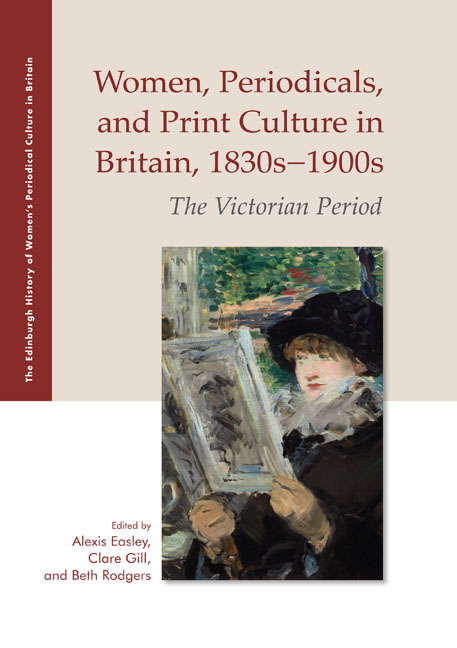Book contents
- Frontmatter
- Contents
- List of Illustrations
- Acknowledgments
- Introduction: Women, Periodicals, and Print Culture in the Victorian Period
- Part I (Re)Imagining Domestic Life
- Part II Constructing Modern Girls and Young Women
- Part III Women and Visual Culture
- Part IV Making Space for Women
- Part V Constructing Women Readers and Writers
- Constructing Women Readers and Writers: Introduction
- 24 ‘Afford[ing] me a Place’: Recovering Women Poets in Blackwood's Edinburgh Magazine, 1827–1835
- 25 Constructing the Mass-Market Woman Reader and Writer: Eliza Cook and the Weekly Dispatch, 1836–1850
- 26 Elizabeth Gaskell and the Habit of Serialisation
- 27 Gender and Genre in Reviews of the Theological Novel
- 28 Reading Poet Amy Levy through Victorian Newspapers
- 29 ‘I simply write it to order’: L. T. Meade, Sisters of Sherlock, and the Strand Magazine
- Part VI Intervening in Political Debates
- Notes on Contributors
- Index
- Plate section
24 - ‘Afford[ing] me a Place’: Recovering Women Poets in Blackwood's Edinburgh Magazine, 1827–1835
from Part V - Constructing Women Readers and Writers
Published online by Cambridge University Press: 25 October 2019
- Frontmatter
- Contents
- List of Illustrations
- Acknowledgments
- Introduction: Women, Periodicals, and Print Culture in the Victorian Period
- Part I (Re)Imagining Domestic Life
- Part II Constructing Modern Girls and Young Women
- Part III Women and Visual Culture
- Part IV Making Space for Women
- Part V Constructing Women Readers and Writers
- Constructing Women Readers and Writers: Introduction
- 24 ‘Afford[ing] me a Place’: Recovering Women Poets in Blackwood's Edinburgh Magazine, 1827–1835
- 25 Constructing the Mass-Market Woman Reader and Writer: Eliza Cook and the Weekly Dispatch, 1836–1850
- 26 Elizabeth Gaskell and the Habit of Serialisation
- 27 Gender and Genre in Reviews of the Theological Novel
- 28 Reading Poet Amy Levy through Victorian Newspapers
- 29 ‘I simply write it to order’: L. T. Meade, Sisters of Sherlock, and the Strand Magazine
- Part VI Intervening in Political Debates
- Notes on Contributors
- Index
- Plate section
Summary
MUCH OF THE CRITICAL analysis of the relationship between Blackwood's Edinburgh Magazine (also known as Maga) and its female contributors is coloured by Margaret Oliphant's claim that Blackwood's ‘has her ladies too, but, shall we own it? Perhaps loves them less’ (Jan 1887: 127). This cautious point, made in the 1887 review essay ‘In Maga's Library: The Old Saloon,’ conjures the image of an almost exclusively masculine space where the work of women writers is tolerated but not encouraged. Lisa Niles reads the early volumes of Blackwood's ‘as a space of male homosociality’ (2003: 102), a space explicitly defined as one that places women outside of the world of men and the act of writing. As Niles notes, however, ‘making definitive claims about the function of women in Blackwood's is a dangerous business’ (119). Although the usual assumption is that few women published in the magazine in its early days, from 1827 to 1835 the work of several women poets appeared in the magazine, including Felicia Hemans, Caroline Bowles, Catherine Grace Godwin, Margaret Hodson, Eliza Hamilton, Lady Emmeline Stuart Wortley, and Augusta Norton. This time period, after the deaths of Lord Byron and Percy Shelley in 1824 and the 1825 financial crash, marks a span of time when women poets came to the forefront of poetry publishing. By the mid-1820s, ‘The age of what [Letitia] Landon calls “a lady's rule” in poetry had begun’ (Cronin 2002: 95).
Given their prominence in rival periodicals and in the literary annuals, it is not surprising that William Blackwood, the shrewd editor and publisher of Blackwood's, included the work of women poets within its pages. What is surprising is that these women actively negotiated with him, pursuing placement in the magazine as means of furthering their own careers. Hemans, Bowles, Hodson, Godwin, and Hamilton all negotiated directly with William Blackwood. In a letter dated 12 June 1827, for example, Felicia Hemans wrote to Blackwood, informing him, ‘I really shall have pleasure in becoming an occasional contributor to a work possessing so many writers of talent’ (2000: 494). Of course, Blackwood would have to meet her financial terms.
- Type
- Chapter
- Information
- Women, Periodicals and Print Culture in Britain, 1830s–1900sThe Victorian Period, pp. 399 - 412Publisher: Edinburgh University PressPrint publication year: 2019

